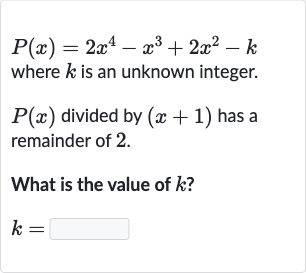Full solution
Q. where is an unknown integer. divided by has a remainder of .What is the value of ?
- Apply Remainder Theorem: To find the value of , we will use the Remainder Theorem, which states that if a polynomial is divided by , the remainder is . Since we are dividing by , we will find .
- Substitute : Substitute into the polynomial .
- Set equal to : According to the problem, the remainder when is divided by is . Therefore, we set equal to .
- Solve for k: Solve for k.

